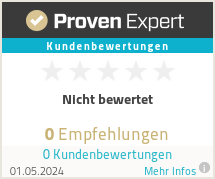
Integration course Munich centrally located in Munich's old town
Munich is one of the most beautiful cities in Germany. The Bavarian capital inspires with its variety of sights, culture and leisure activities. However, if you're new to Munich, it can be a bit difficult to find your way around. There are so many different neighborhoods and districts where you can settle down. But don't worry! We have the perfect solution for you: an integration course in Munich. In this course you will learn everything about the city and its inhabitants.
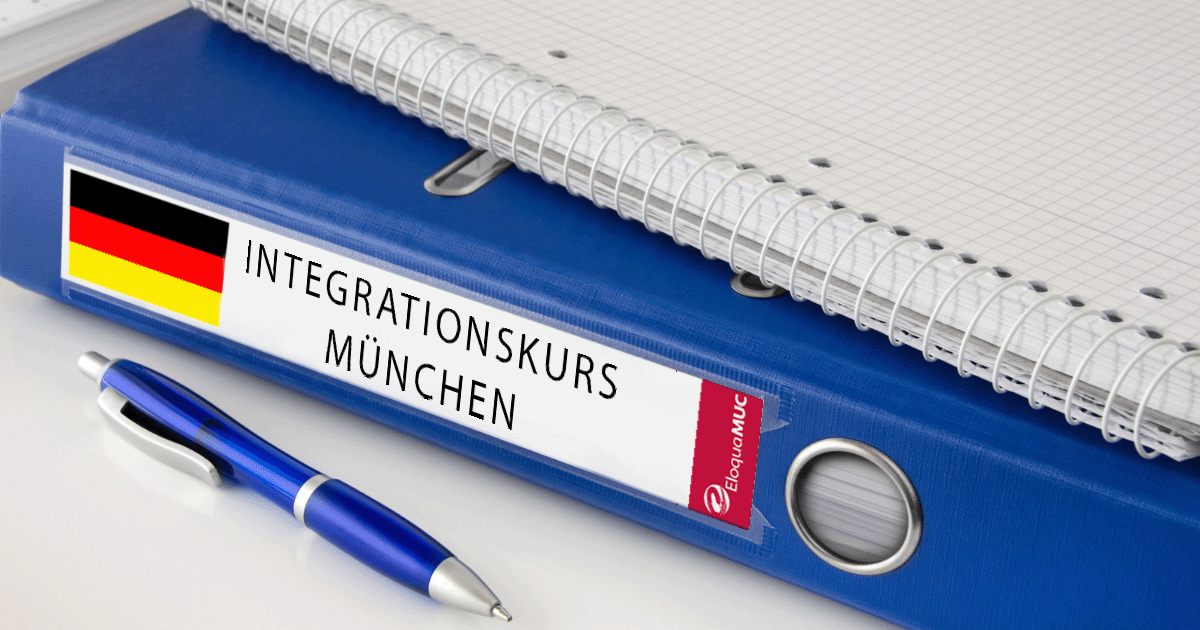
Since the integration courses are a special type of German courses, all important information is compiled to provide a broad overview of what the purpose of integration courses are, where and how they take place, how expensive the courses are, who can take part in such a course and how best and easy to register for an IC.
What is the integration course?

The integration course is a subsidised language course that supports foreigners, EU citizens and German nationals with insufficient German language skills who live permanently in Germany. The course consists of a maximum of 700 lessons in total (1 lesson = 45 minutes) and ends with a final test. It consists of a basic and an advanced language course of 3 x 100 lessons each as well as an orientation course (100 lessons) with the topics of the legal system, culture and history of Germany.
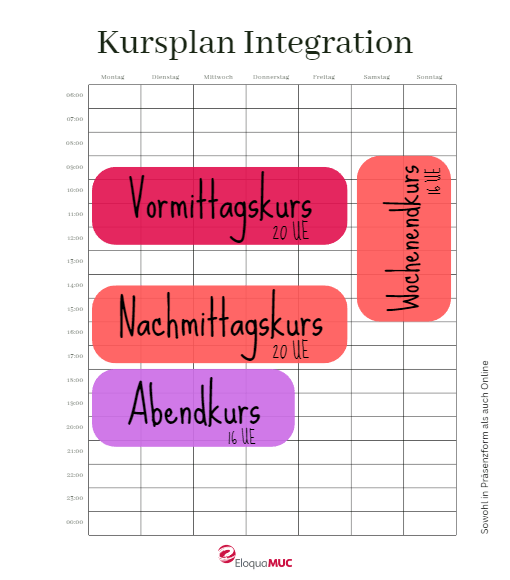
Depending on the type of course, the course takes place Monday to Friday mornings from 9:30 a.m. to 12:45 p.m., afternoons from 2:30 p.m. to 5:45 p.m. with 20 units per week or Monday to Thursday evenings from 6:00 p.m. to 9:15 p.m. with 16 lessons per week and costs €2.29 per lesson for participants with authorization (free for participants with obligation). Occasionally, integration courses can also take place on weekends, Saturdays and Sundays, with eight units a day, i.e. 16 units a week. In order to participate in the course, interested parties must submit an application for admission to the Federal Office for Migration and Refugees (BAMF) and submit a certificate of eligibility or obligation. For participants with previous knowledge, a placement test is provided to determine the correct module. The integration course is subsidized by the state and there is the possibility of cost exemption if you have unemployment benefit II, help for subsistence, or a low income.
What do you have to consider if you want to start an integration course in Munich?
The following list provides a general overview of the most important criteria to consider when starting an integration course, such as the number of participants, the cost factor, the content of this type of course, language certificates, learning support, time required and access to the labour market.
1. Integration course Munich: number of participants and level of difficulty
The integration course in Munich is suitable for participants with different previous knowledge. It comprises a total of 700 hours and consists of a language course and an orientation course. The language course consists of three modules of 100 lessons each, while the orientation course lasts 100 hours. The course is approved by the Federal Office for Migration and Refugees ( BAMF) and participants must have an entitlement or obligation from the BAMF, the Foreigners' Registration Office or the Job Centre in order to participate. The maximum number of participants is 20 per course section.
2. Integration course Munich: costs and budget
The course costs 2.29 euros per lesson with a registration fee of 229 euros per month. The course is offered both during the week and on weekends depending on the course location. Participants must make sure to be present regularly, as attendance is an important criterion for admission to the DTZ. With the final test "German Test for Immigrants", the language level B1 of the Common European Framework of Reference for Languages (CEFR) is achieved. Self-payers pay the full price of currently (as of March 2023) €458/module. Some schools, such as EloquaMUC , offer a discounted rate of only €399/module.
Overview of the costs depending on the status of the participant:
- Participants with free of charge: free of charge (usually the job center covers the costs of the course and travel)
- Participants with authorization: 229€/module (1 module = 100 teaching units of 45 minutes each)
- Participants without authorization: up to €458/module (half of the BAMF's share is omitted here and must be borne by the participant)
3. Integration Course Munich: Teaching Topics and Methods
The integration courses in Munich deal with the topics of the legal system, culture and history of Germany. The methods are practice-oriented teaching, online exams, group work, role plays, discussions, case studies, simulations and video analyses. Right from the start, only German in the course is discussed, which specifies the successful teaching method. Due to the large proportion of participation, participants are encouraged and trained to experience the German language independently and to reproduce it independently. The state-approved teacher serves as a guide and moderator in the course.
4. Integration course Munich: language skills and certificates
For an integration course in Munich, language skills according to the Common European Framework of Reference for Languages (CEFR) at level A2/B1 or higher are targeted. As a rule, the participants have little or no previous knowledge. The language course deals with important topics from everyday life, such as shopping, living, work, leisure, media, writing e-mails, filling out forms. In the orientation course, you will talk about the German legal system, history, culture, values, rights and obligations in Germany. At the end of the course, participants must complete and pass the German Test for Immigrants (DTZ) in order to reach language level B1 . In addition, they take a test for the orientation course in order to receive the "Integration Course" certificate. In addition to full-time courses, there are also part-time courses, weekend courses, youth integration courses, courses with childcare or literacy courses.
5. Integration course Munich: Language difficulties and support
In Munich, integration courses offer language support for people who need to integrate into a new culture. In these courses, participants are helped to reach level B1 of the Common European Framework of Reference for Languages. This is achieved by teaching language and values at an early stage. This includes special integration courses for people without literacy, for women, young people and parents. In addition, professional language courses, an initial orientation, integration counselling centres, coaching for the labour market and intensive and remedial courses can be attended and taken.
In order to provide the best possible support for integration, the prospective integration courses in Munich should take into account the language problems that arise from switching between different written languages. These problems can be overcome through targeted preparation and support. Courses should also keep in mind knowledge of different dialects and cultures to provide each participant with a comprehensive understanding .
6. Integration course Munich: Time expenditure and working time
After a certificate of eligibility or obligation has been issued by the BAMF, the Foreigners' Registration Office or the Job Centre, registration with the German school is possible at any time. If you have previous knowledge, it is possible to be placed in a higher module. In order to take the placement test, prior online registration is required. To do this, you should bring your original certificate of eligibility/obligation and your ID/passport with you for placement and registration.
7. Munich Integration Course: Promotion and Access to the Labour Market
The promotion and access to the labour market help the integration course in Munich by helping immigrants to learn and use the German language and culture more quickly. The course gives participants the opportunity to familiarize themselves with the rights, obligations and values in Germany. The course also offers a coaching service to help participants find a job and enable better integration into the German working world. In addition to numerous intermediate exams, the course also includes a final test to test the learning of the German language. This helps participants to be successful in learning the German language and integrating into the job market in Germany.
Our integration courses at a glance
Integration courses are the right place for you.
Every week, from levels A1 to C1. We have several offers for this type of course in Munich:
Select the appropriate course below and enroll.
Jetzt Ihren Deutschkurs finden
Lernen Sie mit uns schnell und effektiv Deutsch!
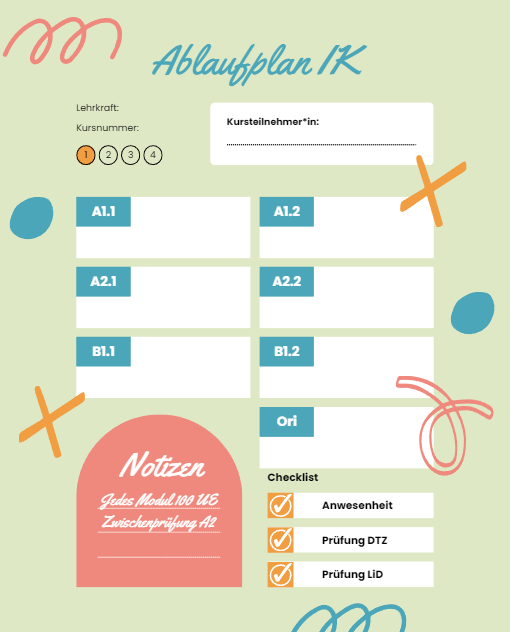
1. What types of IKs are there?
Integration courses (IKs) are German courses subsidized by the state (BAMF) and last six modules with one hundred hours each. The courses cover levels A1 to B1 (no higher levels) and end with the German test for immigrants. This is followed by an orientation course with one hundred hours of instruction, which imparts knowledge of the legal system, culture and history of Germany and ends with the final test "Living in Germany" (LiD). EloquaMUC's integration courses take place in Munich on weekdays as well as on weekends and are thus flexibly tailored to all time specifics. For participants who have not yet mastered the German alphabet, there are literacy courses. Registration and placement tests take place by telephone on Wednesdays and Fridays from 6:00 p.m. to 8:00 p.m. and on Saturdays from 10:00 a.m. to 12:00 p.m . every quarter of an hour. For personal registrations on site, participants can register directly at the registration office in Kreuzstr. 14 in the 3. Stick to pass by. Phone.: +498912035733.
2. What are the courses needed for?
Integration courses are offered to help immigrants and their family members integrate into German society and culture. They enable participants to learn the language, to understand the basics of German law and culture, and to follow German political and social norms.
The integration course can be booked full-time or part-time and consists of a series of modules financed by the Federal Office for Migration and Refugees. In the courses, participants can acquire theoretical and practical skills related to the German language, increase their competencies for the job market and develop a better understanding of German culture and society. Upon successful completion of the courses, participants will receive a certificate.
The integration course can also be booked as part of the German course for the profession (DeuFöV), which is offered by the Employment Agency/Job Center in Munich. The cost of the course can be exempted upon application if the participants receive unemployment benefit two or subsistence assistance or if they find it particularly difficult to pay due to low income.
The courses conclude with the "German Test for Immigrants" (DTZ) and the "Living in Germany" test.
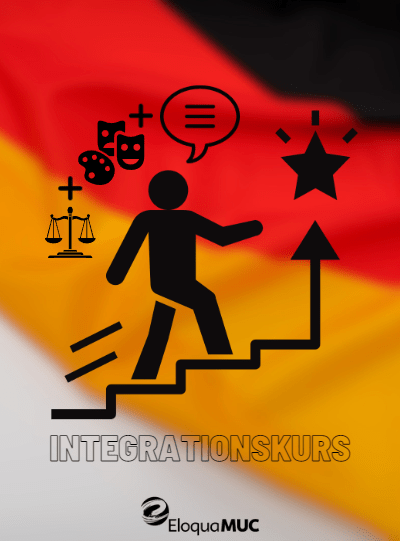
3. Who can attend the courses?
With a certificate of eligibility or commitment from the Immigration Office, foreigners, EU citizens, German citizens without sufficient German language skills as well as children, adolescents and young adults who no longer attend school can attend the integration course. If you are not entitled to a course place, but would like to participate voluntarily, you can submit an application for admission to the Federal Office for Migration and Refugees. People who receive unemployment benefit II or assistance for subsistence can be exempted from paying the cost contribution upon application and take part in the courses free of charge. There are also special courses for teenagers and young adults up to 27 years of age, as well as for women and literacy courses. Further information can be found on the website of the Federal Office for Migration and Refugees or can be obtained from the Foreigners' Registration Office.
4. Are there waiting lists for integration courses?
Yes, there are waiting lists for integration courses. Since the demand for course places is strong, interested parties can be put on a waiting list if the course is already fully booked. In order to be put on the waiting list, interested parties can submit an application for admission to the course at the Federal Office for Migration. As soon as a place becomes available, the interested parties from the waiting list will be notified. If you are entitled to an integration course place, you can choose which provider you would like to take the course with.
5. What are the requirements for the courses?
In order to participate in the integration course, certain requirements must be met. Immigrants who live legally and permanently in Germany and speak little or no German must be eligible to participate in the general integration course. For certain persons, there is an obligation to participate by law (e.g. in the case of family reunification). Under certain circumstances, people who have been living here for a long time and have little or no German may be obliged to take an integration course (e.g. job seekers). Others, on the other hand, (e.g. EU citizens) are not legally entitled to an integration course, but are only entitled to participate in a course within the framework of free places. There are also special integration courses for women or young people, as well as for immigrants who are not yet able to read and write sufficiently. Participation in the courses is financed by the state and a fee is also required from the course participants.
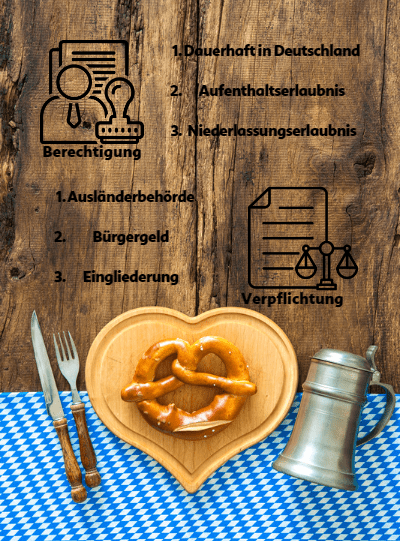
6. How can I register for a course?
There are several ways to register for an integration course. If participants have received a certificate of eligibility or commitment from the Foreigners' Registration Office , they can choose which provider they would like to take the course with. You can find the addresses of all course providers of integration courses on the BAMF website. Here you can search for course providers directly in your area. You can then see the results with information such as address or telephone number on a map.
If there is no German or very little knowledge of German, there is usually an obligation to participate, i.e. an integration course must be attended. The Immigration Office then issues the participants with an eligibility to participate and a list of course providers, i.e. language schools. Then they can look for a language school near you and register there.
If there is no entitlement to an integration course place, but would like to participate voluntarily, volunteers can apply to the Federal Office for Migration and Refugees for admission to the integration course. The application can be submitted directly to the Federal Office or to the selected course provider.
To register at a language school , participants report in person during office hours on site. At the registration office, people can take a free placement test, which can be used to determine previous knowledge and place them in the right course section.
If you would like to attend a course but do not yet have a childcare place for your children, the Coordination Office for Childcare for Integration Course Participants supports you.
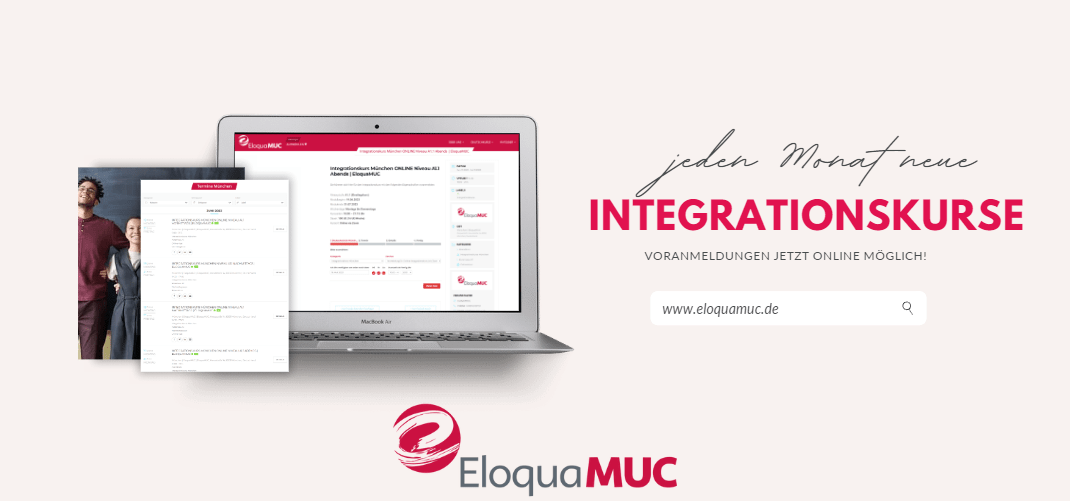
7. How long do the courses last?
The integration course lasts a total of 700 lessons, of which 600 lessons are for the language course and 100 lessons for the orientation course. Usually you have 4 or 5 lessons per day if the course takes place during the week. The course then lasts from 6 to 7 months. But there are also more intensive courses, slower courses in the morning, afternoon or evening, which then last correspondingly longer. The orientation course lasts 3 to 4 weeks and has 100 lessons. Here, too, there are more intensive courses, courses in the morning, afternoon or evening. Ask the instructor for more options.
8. Are the courses free of charge?
No, the courses are not free. Eligible students must pay their own fee. However, they can be exempted from paying the cost contribution upon application if they receive unemployment benefit II or assistance for subsistence (social assistance) or if payment is particularly difficult for them due to their low income. As an additional incentive, the Federal Office will refund 50% of the course fee paid if the final test is successfully passed within two years of the start of participation. The course provider will inform you in detail about the costs, attendance lists and, if applicable, refunds upon registration.
9. Is it possible to take courses part-time?
An IC part-time is quite possible depending on the course provider. In general, most courses are designed to convey the learning material gently and effectively over several months with three to five teaching units a day. This gives the participants the opportunity to pursue a profession in addition to the integration course or to care for children and young people. An intensive course, such as a weekend course, morning course or holiday course, is referred to as 25 units (teaching units) per week.
How many hours are required to pass an integration course?
The integration course comprises a total of 700 lessons. Participants start with a basic and an advanced language course, each comprising 3 x 100 lessons. This is followed by an orientation course with 100 lessons in which topics such as the legal system, culture and history of Germany are dealt with. For participants with previous knowledge, it is possible to start in a higher module, which is determined by a placement test. The course ends with the final test "German Test for Immigrants" (DTZ) and the test "Living in Germany". Regular attendance is essential for passing the integration course. This is recorded via participation lists, which must be signed by the participant and teacher on each day and are checked by the BAMF.
Make a free appointment at our language school in Munich (directly at Sendlinger Tor)!
You will receive a placement test free of charge.

The best integration courses
Complete the integration course at our language school in Munich
Die Eloqua-Methode
- Erreichen Sie Ihr Ziel bis zu 20 % schneller als mit anderen Kursanbietern*
- Maximaler Lernerfolg dank individueller Betreuung
- Hochwirksames Multimedia-Training
- Methodik des selbstgesteuerten und unabhängigen Lernens
- Erstklassiges Lehrpersonal mit langjähriger Erfahrung
*Gilt für private Deutschkurse. Integrationskurse werden staatlich reglementiert.
Sie haben noch Fragen?
Finden Sie jetzt den passenden Kurs
oder kontaktieren Sie uns einfach

EloquaMUC Team
Wir ermutigen und befähigen unsere Lehrer, Führungspersönlichkeiten zu sein und aktiv zur Schaffung einer besseren Zukunft beizutragen.

Patrycja Chachulska

Joël Picard

Lena Müller

Cathrin Klosius
Frequently asked questions about integration courses
Kann man an einem Integrationskurs auch online teilnehmen?
With the onset of the Covid-19 pandemic, the BAMF made online integration courses (online ICs) possible. EloquaMUC also offers this type of locally flexible courses, which are especially beneficial for mothers and the self-employed.
In welcher Frequenz finden Integrationskurse (IKs) statt?
Integration courses usually take place four to five times a week. They are usually 600 teaching units (UE) long and are carried out according to the guidelines of the Federal Office for Migration and Refugees (BAMF). After completing the course, participants have the opportunity to take part in an orientation course (LiD) with 100 units.
Wo findet der Integrationskurs in München statt?
The integration courses are held at the locations of the EloquaMUC language schools. These include the main building in Munich's old town, in the listed building of Kreuzstr. 14, 80331 Munich, as well as other branch offices in Pasing and Schwabing. Exceptions are online integration courses, which can be attended from anywhere via video conference.
Was ist der Unterschied zwischen Berechtigung und Verpflichtung für einen Integrationskurs?
The difference between eligibility and obligation for an integration course is who is allowed to participate in such a course. Persons who have received a certificate of eligibility from the Foreigners' Registration Office are free to choose which provider they would like to take the course with. These persons have a right to participate in the course, but are not obliged to do so. On the other hand, there are people who are either legally obliged to participate in an integration course or are entitled to a course place. These are, for example, people who want to stay in Germany permanently or who are classified as job seekers. In addition, people who do not have a legal right to a course place can also voluntarily participate in an integration course. These persons must submit an application for voluntary admission to the integration course.
Our teachers will be happy to help you with any questions you may have as a student. You can also visit our capital Berlin. There is a lot to see there and you can talk German.
Reicht der Berechtigungsschein für die Anmeldung?
Yes, the certificate of eligibility is sufficient for registration. It entitles participants to register with a course provider of their choice. Before registering, you usually have to take a placement test first to ensure that participants are not under- or over-challenged in a module.
Welche Kosten sind mit dem Integrationskurs verbunden?
Costs: The fee for the general integration course is 2.29 euros per teaching unit, so that the course costs a total of 1,603 euros (as of March 2023).
In case of financial or personal need, course participants can be exempted from paying the fee if they submit an application to the locally competent regional office of the Federal Office for Migration and Refugees and enclose proof of financial need.
Was sind die Voraussetzungen, um am Integrationskurs teilnehmen zu können?
In order to participate in the integration course, participants must live permanently in Germany and do not have sufficient German language skills. Children, adolescents and young adults who are still in school are not allowed to participate. Interested parties must submit an application for admission to the course at the Federal Office for Migration. The course is financed by the state from funds from the federal budget. Eligible course participants have to pay their own contribution to the costs or can be exempted from paying the fee on application if they receive unemployment benefit II or assistance for subsistence (social assistance) or if payment is particularly difficult for them due to their low income. Interested parties who are not entitled to an integration course place can submit an application for admission to the integration course directly to the Federal Office for Migration and Refugees or to the course provider you have selected.
Wie lange dauert der Integrationskurs in München?
The integration course in Munich usually lasts 700 lessons. It consists of a language course (600 hours) and an orientation course (100 hours). The language course usually has 4 or 5 lessons per day and lasts 6 to 7 months. The orientation course usually has 5 lessons per day and lasts 3 to 4 weeks. But there are also more intensive courses, courses in the morning, in the afternoon or in the evening. Both courses will be free on weekends. The final test consists of a language exam and a test on the material from the orientation course.
Wo kann man mehr Informationen über den Integrationskurs in München erhalten?
If you need more information about the integration course in Munich, you can find all the important information on the website of the Federal Office for Migration and Refugees. There you can also find a list of all providers in your area. Counselling centres for migration as well as public institutions such as the Munich City Hall are also happy to help you find a suitable course.
Wer bekommt einen Kurszuschuss?
The integration course is financed by the state from federal budget funds and can be a valuable opportunity for people who live permanently in Germany to learn the German language. Eligible students must pay their own fee.
However, there are some groups of people who can receive grants for the course. These include persons who apply for unemployment benefit II or social assistance, persons who have a low income, persons who receive benefits from the Job Centre, persons who have received a certificate of eligibility from the Federal Office for Migration and Refugees or a certificate of commitment from the Foreigners' Registration Office, and persons who apply for admission to the course at the Federal Office for Migration.
For persons who have received a certificate of eligibility or commitment from the Foreigners' Registration Office, the costs are 229 euros per module (100 teaching hours). For self-payers who are not entitled to an integration course place, the costs are correspondingly higher. Participants who receive benefits from the job centre can apply for a cost exemption.
In the case of state funding, the price is € 2.29 per lesson. Fee exemption can be applied for upon request.
Fahrtkostenzuschuss: Werden die Fahrtgelder für den Integrationskurs erstattet?
A well-organized course provider automatically and promptly reimburses those participants who are exempt from travel costs for travel expenses, which needy participants pay in advance and receive back after a short time. However, individual payments may be delayed due to bureaucratic reasons.
Womit endet der Integrationskurs? Kurze Erklärung zum DTZ und LiD
The integration course ends with a scaled language test as well as a nationwide test for the orientation course. After a total of 700 hours, participants receive an "Integration Course" certificate after successful completion of the final test. The language exam must be passed at level B1 in order to successfully complete the course. The test for the orientation course includes topics such as German history and culture, rights and duties in Germany, political contexts, religious freedom, tolerance and equality. With the consent of the course provider, participants can skip or repeat proficiency levels. The category "Speaking", which is a core competence of the language course, must be passed at level B1 in order to receive a certificate at level B1 in the general assessment.
The integration course Munich is a great course to find your way in a new environment. By participating in this course, participants will be able to better adapt to their new environment. Now to pre-register for the integration course in Munich!
Lernen Sie Deutsch mit dem Experten in Deutschland
Unsere Kooperationspartner:
